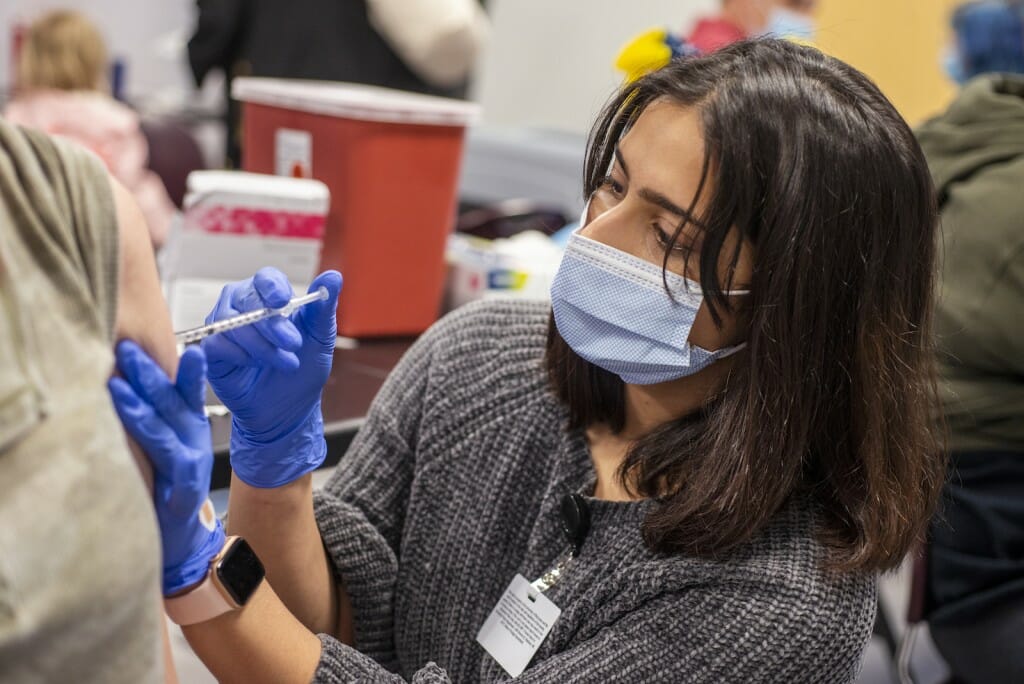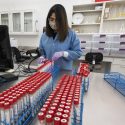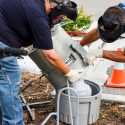UW School of Pharmacy focused on equitable COVID-19 vaccine access

PharmD student Janvi Shah administers the vaccine during the clinic in Sun Prairie.
On Wednesday, June 16, the University of Wisconsin–Madison School of Pharmacy’s Associate Dean for Diversity and Inclusion Initiatives, Lisa Imhoff, will join the U.S. Surgeon General, Vivek Murthy; the CEO of the Boys and Girls Club of Dane County, Michael Johnson; and others in a national panel discussion centered around vaccine access in vulnerable communities.

Lisa Imhoff
Imhoff’s participation is just one of several efforts at the School of Pharmacy aimed at addressing COVID-19 vaccine equity and reducing racial disparities in care. The event, which requires registration, will take place at 1 pm ET. A link to registration and more information can be found here.
In partnership with the Boys and Girls Club of Dane County, students and employees of the School of Pharmacy are helping sponsor vaccine clinics and town hall discussions to address vaccine hesitancy and concerns.
A second project, funded by the Wisconsin Department of Health Services and led by pharmacy professor Eva Vivian in partnership with several public health and community organizations in Dane County, including the African American Health Network of Dane County, is also conducting vaccine clinics and information campaigns in under-resourced Madison neighborhoods.
A third effort sees pharmacy students and faculty volunteering in vaccine clinics organized by the Ho-Chunk Nation health care team, providing
vaccines at the Ho-Chunk House of Wellness in Baraboo and the Ho-Chunk Nation District 1 Community Center in Black River Falls.
“These dialogues are just the beginning,” says Mark Moua, a student in the Doctor of Pharmacy program at the School of Pharmacy who has volunteered as part of several initiatives to increase vaccination rates among BIPOC communities. This often means having conversations to address questions and concerns about the vaccines.
“Their concerns and hesitations are valid,” he says. “These difficult conversations need to happen and be heard.”
In Wisconsin as of mid-June, nearly 46 percent of white residents have received at least one dose of a COVID-19 vaccine. For American Indian residents, that drops to just 32 percent — and even lower for Black populations, at 25 percent.

Professor Eva Vivian at a vaccination clinic at the Goodman Center. Photo by Todd Brown
“Black and Indigenous people, and people of color, have suffered greater burdens of COVID-19 and are also potentially more skeptical of health care and therefore the vaccine,” says Mary Hayney, professor of pharmacy practice.
Student pharmacists have played a key role in all of these initiatives, and through changes in the curriculum, faculty are equipping them to respectfully serve diverse populations. This includes a new lecture about the history of racism in medical research.
That context is key to relating to patients and earning trust, says Imhoff. “When we come into communities with a culturally humble lens, we show pharmacy students the power of community outreach and why it’s important to build trust with patients.”
The impact of these initiatives will be felt around the state of Wisconsin, but Hayney reiterates that there is more work to be done, in each patient interaction and in the classroom.
“There is much more that we at the School of Pharmacy can do to address hesitancy, and I think that’s going to be done personally — with personal conversations to truly address the questions — all summer long, into fall,” says Hayney.
To read more about each of the vaccine equity initiatives underway at the UW–Madison School of Pharmacy, visit: https://pharmacy.wisc.edu/combating-racial-disparities-in-covid-19-vaccination/

PharmD student Mark Moua administers the COVID-19 vaccine during the McKenzie Family Boys and Girls Club clinic in Sun Prairie. Photo by Paul L. Newby II



